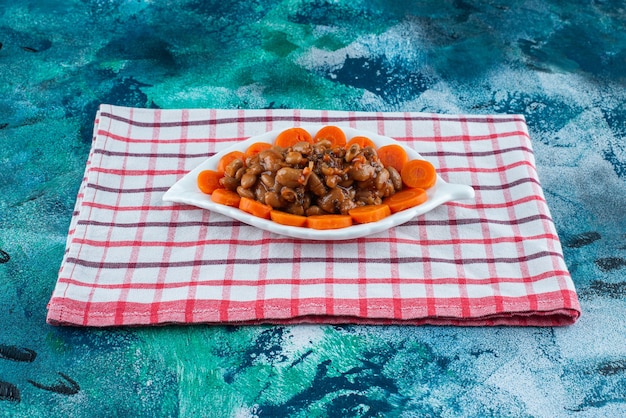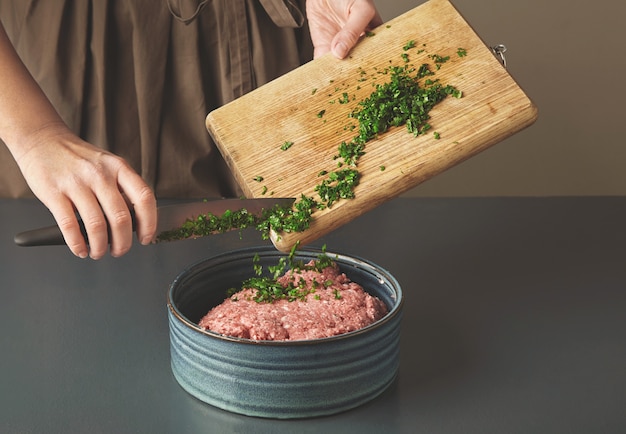You know, I've always been a bit of a dog food fanatic. I love learning about what's best for my furry friends, and lately, I've been really intrigued by beef liver. Now, I know what you're thinking: "Liver? For my dog? Isn't that a bit…weird?" But trust me, it's not weird at all! It's actually a nutritional powerhouse that can do wonders for your dog's health.
But before we dive into all the amazing benefits, let's be real – safety comes first. It's crucial to know how to feed beef liver safely and responsibly. I've been a dog owner for years, and I've seen firsthand how a good diet can make a huge difference in a dog's energy levels and overall health. My old girl, Daisy, was a whippet, and she was always a bit on the lean side. After a vet visit, we discovered she wasn't getting enough nutrients. We started adding a bit of cooked beef liver to her food, and it was amazing! Her coat became shinier, her energy levels went through the roof, and she was a much happier dog overall.
So, let's jump into this exciting world of beef liver and explore all its benefits for your dog. We'll cover all the essential information you need, from safety precautions to serving suggestions, and even some delicious recipes you can try. Get ready for a paw-some adventure!
(Part 1) The Nutritional Powerhouse: Why Beef Liver is a Treat for Your Dog

Beef liver is like a superfood for dogs! It's packed with essential vitamins and minerals that contribute to their overall well-being.
A Vitamin and Mineral Bonanza
Let's start with the big guns:
- Vitamin A: You know how important good eyesight is for your dog, right? Well, vitamin A is crucial for that! It also helps keep their skin healthy and supports bone growth. Beef liver is a top source of this crucial vitamin.
- Vitamin B Complex: This is a whole group of vitamins that are like superheroes for your dog's energy levels. They support energy production, help their nervous system work properly, and boost their immune system.
- Iron: This is a vital mineral that helps carry oxygen throughout their body. Beef liver is an excellent source of iron, especially important for growing puppies and dogs who might have iron deficiency.
- Copper: Copper is important for healthy blood cells, skin, and connective tissue. It's like the glue that holds everything together!
- Other essential minerals: Beef liver also has significant amounts of zinc, selenium, and phosphorus, all vital for a healthy dog.
More Than Just Vitamins: The Benefits of Beef Liver
Beyond the vitamin and mineral content, beef liver offers a range of benefits that can really make a difference in your dog's life:
- Improved coat health: The high vitamin A content promotes a healthy, shiny coat that's the envy of all the other dogs in the park.
- Increased energy levels: The B vitamins and iron give your dog a boost of energy, leaving them feeling lively and playful. You'll have to find new ways to tire them out!
- Stronger immune system: The nutrients in beef liver help support a robust immune system, which means fewer sniffles and sneezes for your furry friend.
- Healthy digestion: The high protein content helps maintain healthy digestion and absorption of nutrients, ensuring your dog gets the most out of their food.
I've always been a big believer in using food to support my dog's health. That's why I'm so enthusiastic about beef liver. It's a natural way to boost their overall well-being and give them the best possible chance at a happy and healthy life.
(Part 2) Safety First: Guidelines for Safe Feeding

Alright, so we've established that beef liver is a nutritional powerhouse, but safety comes first! It's crucial to feed it responsibly to avoid any potential issues.
The "Too Much of a Good Thing" Rule
As with anything, moderation is key. Too much liver can lead to a build-up of vitamin A in your dog's system, which can cause potential health problems. It's like eating too much of your favourite dessert – it might be delicious, but too much can make you feel unwell.
The Dos and Don'ts of Beef Liver
Here's a quick breakdown of the do's and don'ts of feeding beef liver:
Do:
- Choose high-quality, fresh beef liver. Look for a good colour, free from any odd smells or discolouration. You wouldn't want to eat something that smelled funny, and neither would your dog!
- Thoroughly cook the liver before feeding it to your dog. This kills any harmful bacteria that might be lurking. Think of it as a safety precaution for your furry friend.
- Introduce beef liver gradually, starting with small amounts to see how your dog reacts. You wouldn't want to overwhelm their system with something new.
- Consult your vet about the appropriate amount of liver to feed your dog based on their age, size, and breed. They'll know exactly what's best for your individual dog.
- Consider rotating beef liver with other protein sources in your dog's diet for a balanced and diverse nutritional intake. Just like humans, dogs benefit from a varied diet.
Don't:
- Feed raw liver to your dog. This can contain bacteria and parasites that can make your dog sick. It's not worth the risk!
- Overfeed liver. Stick to the recommended guidelines from your vet. Too much of anything can be a bad thing.
- Feed liver that has been treated with antibiotics or other chemicals. These can be harmful to your dog. Always choose natural and healthy options.
(Part 3) Feeding Frequencies and Amounts: A Guide for Responsible Serving

Okay, so we've covered the safety aspects, now let's talk about how much liver is appropriate for your dog. It's all about finding the sweet spot!
General Guidelines:
A good rule of thumb is to start with a small amount, like a teaspoonful, and gradually increase it over time based on your dog's individual needs and reaction. Think of it like a taste test – you wouldn't want to give your dog too much of something new at once.
Frequency:
You can feed beef liver to your dog a couple of times a week, alternating with other protein sources like chicken, fish, or turkey. Don't overdo it! Remember, variety is the spice of life.
Size and Breed Considerations:
The appropriate amount of beef liver will vary depending on your dog's size and breed. For instance, a small breed dog might need less than a larger breed dog. Always consult your vet for personalised recommendations. They'll know what's best for your furry friend.
Age and Health:
Puppies and older dogs might have different nutritional needs. Your vet can advise on appropriate amounts and frequencies for your dog's specific age and health condition. They'll help you find the perfect balance for their individual needs.
Remember, consistency is key. Sticking to a regular feeding schedule and monitoring your dog's response will help you find the perfect balance for their individual needs.
(Part 4) Creative Serving Ideas: From Simple to Sensational
Let's face it, some dogs can be picky eaters. But don't worry, we've got some creative ideas to make beef liver appealing to even the most finicky furry friend.
Simple and Savory
For a basic and tasty treat, simply cook the beef liver and chop it into bite-sized pieces. You can mix it with your dog's regular food or offer it as a separate treat. It's a simple way to sneak in some extra nutrition.
Liver-licious Homemade Treats
If you're feeling adventurous, try making your own homemade liver treats!
Here's a simple recipe:
Beef Liver Treats
- 1 lb beef liver, chopped
- 1 cup plain yogurt (choose plain yogurt without added sugars)
- 1 egg (ensure the egg is cooked thoroughly)
- 1/2 cup rolled oats
- 1/4 cup wheat germ
1. Preheat your oven to 350°F (175°C).
2. Combine all ingredients in a bowl and mix well.
3. Roll the mixture into small balls or flatten it into thin patties.
4. Bake for 20-25 minutes, or until cooked through. You can tell they're done when they're firm to the touch.
5. Allow the treats to cool completely before giving them to your dog.
These treats are a healthy and delicious way to incorporate beef liver into your dog's diet. You can experiment with different ingredients and flavours to find your dog's favourite combination. Maybe add a bit of parsley or a sprinkle of pumpkin spice for a festive touch!
Liver-Infused Dog Food
For a convenient option, you can add cooked beef liver to your dog's commercial food. Simply chop it up and mix it in. It's a simple way to boost their nutrition without having to make separate treats.
(Part 5) The Importance of Rotation: Diversifying Your Dog's Diet
While beef liver is a fantastic addition to your dog's diet, it's essential to provide a diverse range of protein sources.
Variety is the Spice of Life
Just like humans, dogs benefit from a varied diet. Rotating protein sources ensures they receive a wider range of essential nutrients and helps prevent dietary imbalances. It's like having a colourful plate of food – it's much more interesting and nourishing than just one type of food.
The Benefits of Rotation:
- Reduced risk of allergies: Changing up the protein sources can help prevent or manage allergies that might develop from consuming the same protein consistently. Think of it as keeping their system guessing!
- Balanced nutrition: Different protein sources provide different nutrients, ensuring your dog gets a well-rounded diet. It's like having a complete set of vitamins and minerals!
- Enhanced taste and interest: Variety in your dog's food can make mealtimes more exciting and encourage them to eat with gusto. They'll be more likely to gobble up their food when they're excited about it!
Remember, the key is to find a balance between offering beneficial foods like beef liver and ensuring your dog gets a diverse and healthy diet.
(Part 6) Spotting Potential Issues: Signs to Watch Out For
As with any new food introduction, it's essential to be aware of any potential issues. It's better to be prepared!
Recognising Signs of Trouble
If your dog experiences any of the following after eating beef liver, stop feeding it and consult your vet:
- Digestive upset: Vomiting, diarrhoea, or gas. These can be signs that their system isn't quite used to beef liver yet.
- Allergic reactions: Skin rashes, itching, or swelling. This could be a sign of an allergic reaction to beef liver.
- Loss of appetite: A significant decrease in their usual food intake. This could indicate that something isn't right.
- Changes in energy levels: Sudden lethargy or excessive hyperactivity. These can be signs of something more serious.
Don't Panic!
Don't worry if your dog shows a minor reaction, like a little bit of gas. It's a good idea to introduce liver gradually to give their system time to adjust. However, if you notice any of the more severe symptoms mentioned above, seek veterinary advice immediately.
(Part 7) Beef Liver: A Delicious Journey for Your Dog
Beef liver, when fed responsibly, can be a truly beneficial addition to your dog's diet. It's a nutritional powerhouse that can enhance their overall health and energy levels.
Embrace the Benefits
By following the guidelines we've discussed, you can enjoy all the benefits of beef liver for your furry friend. Remember to always consult with your veterinarian to determine the appropriate amounts and feeding frequencies for your dog's individual needs. They're the experts when it comes to your dog's health!
Sharing the Experience
I'd love to hear your experiences with feeding beef liver to your dog! Share your stories, tips, and recipes in the comments section below. Let's create a community of dog owners who are passionate about providing the best possible nutrition for our beloved companions. It's always great to learn from each other!
(Part 8) FAQs: Answering Your Liver-Related Questions
You've got questions, we've got answers! Here are some frequently asked questions about beef liver and dog nutrition.
1. Can I give my dog raw beef liver?
Absolutely not! Raw liver can contain harmful bacteria and parasites that can make your dog very sick. Always cook beef liver thoroughly to kill any potential pathogens. It's better to be safe than sorry!
2. How often can I feed beef liver to my dog?
A couple of times a week is a good starting point, but always consult your vet for specific recommendations based on your dog's age, breed, and health. They'll know what's best for your furry friend.
3. What if my dog has a sensitive stomach?
If your dog has a sensitive stomach, start with a very small amount of cooked beef liver and monitor their reaction carefully. You can try mixing it with their regular food or offering it as a treat. It's all about finding what works best for your dog.
4. Is beef liver good for all dog breeds?
Yes, beef liver can be beneficial for most dog breeds. However, always consult your vet to ensure it's suitable for your dog's specific needs. It's always best to err on the side of caution.
5. What are some other healthy treats I can give my dog?
There are plenty of healthy treats you can give your dog, including:
- Cooked chicken or fish (make sure it's cooked thoroughly)
- Fruits and vegetables (in moderation, as some can be toxic to dogs)
- Plain yogurt (choose plain yogurt without added sugars)
- Pumpkin purée (it's great for digestion!)
- Homemade dog treats using healthy ingredients (get creative!)
Remember, treats should make up a small percentage of your dog's overall diet. They're a special treat, not a staple.
(Part 9) A Paw-sitive End Note: Love, Liver, and Your Dog
Feeding your dog a healthy diet is a crucial part of providing them with a long and happy life. Beef liver, when incorporated responsibly, can be a valuable addition to their nutritional routine.
I encourage you to experiment with different ways to feed beef liver to your dog, whether it's in their regular food, as a homemade treat, or as a tasty snack. Find what your dog loves!
Remember, always consult with your vet about any dietary changes you're considering for your furry friend. They can provide tailored guidance based on your dog's specific needs. They're your partner in keeping your dog healthy!
And finally, enjoy the journey! Feeding your dog a healthy and delicious diet is an act of love and care. It's a way to show them how much you appreciate their presence in your life. After all, they're our best furry friends!
Everyone is watching

Perfect Rice Every Time: The Ultimate Guide to Cooking Rice
Cooking TipsAs a self-proclaimed foodie, I've always been a bit obsessed with rice. It's the foundation of countless cuisi...

Prime Rib Roast Cooking Time Chart: Per Pound Guide
Cooking TipsPrime rib roast. Just the name conjures images of lavish dinners, crackling fires, and hearty laughter. It’s ...

The Ultimate Guide to Cooking Asparagus: Tips, Techniques, and Recipes
Cooking TipsAsparagus. The mere mention of this spring delicacy conjures up images of vibrant green spears, crisp and burs...

Ultimate Guide to Cooking the Perfect Thanksgiving Turkey
Cooking TipsThanksgiving. Just the word conjures up images of overflowing tables laden with delicious food, the scent of r...

How Long to Bake Potatoes in the Oven (Perfect Every Time)
Cooking TipsBaked potatoes are a staple in my kitchen. They're incredibly versatile, delicious, and surprisingly easy to m...
